Among Us and Civilisation to Train Decision Makings Skills
Year of production: 2023
Credits: Civilisation © Firaxis
We will be talking about “Among Us” and “Civilization 6”, in particular its latest expansion “Gathering Storm”, as spaces to train and address some specific aspects of participation, such as decision-making and taking informed decisions, being aware of the systemic complexity of our reality, where every decision and action has an impact on the whole system.
About the game: Among Us
Described as a “party game of teamwork and betrayal”, Among Us was initially only released for Android and Apple iOS mobile devices, then on Steam for Windows PCs. It arrived on consoles (PlayStation, Xbox, Nintendo Switch) in 2020-21. It is free to play on mobile devices (with ads), while the Steam version for consoles and PCs currently costs EUR 3.99 (8.19 for the VR version).
The concept was inspired by the super popular social deduction game “Mafia” (aka “Werewolves”), played in colleges and youth clubs worldwide, and by John Carpenter’s movie “The Thing” (1981) for its sci-fi setting.
The game became hugely popular in 2020, initially thanks to streamers from South Korea and Brazil. It is believed that the COVID-19 global emergency contributed to its peak, as people were looking for ways to socialise despite the forced social distancing.
How to play Among Us
The players take on the role of crew members who have to perform tasks on a spaceship. One of them, however, is “The Impostor”. The Impostor’s job is to sabotage the ship and kill as many crewmates as possible in the process.
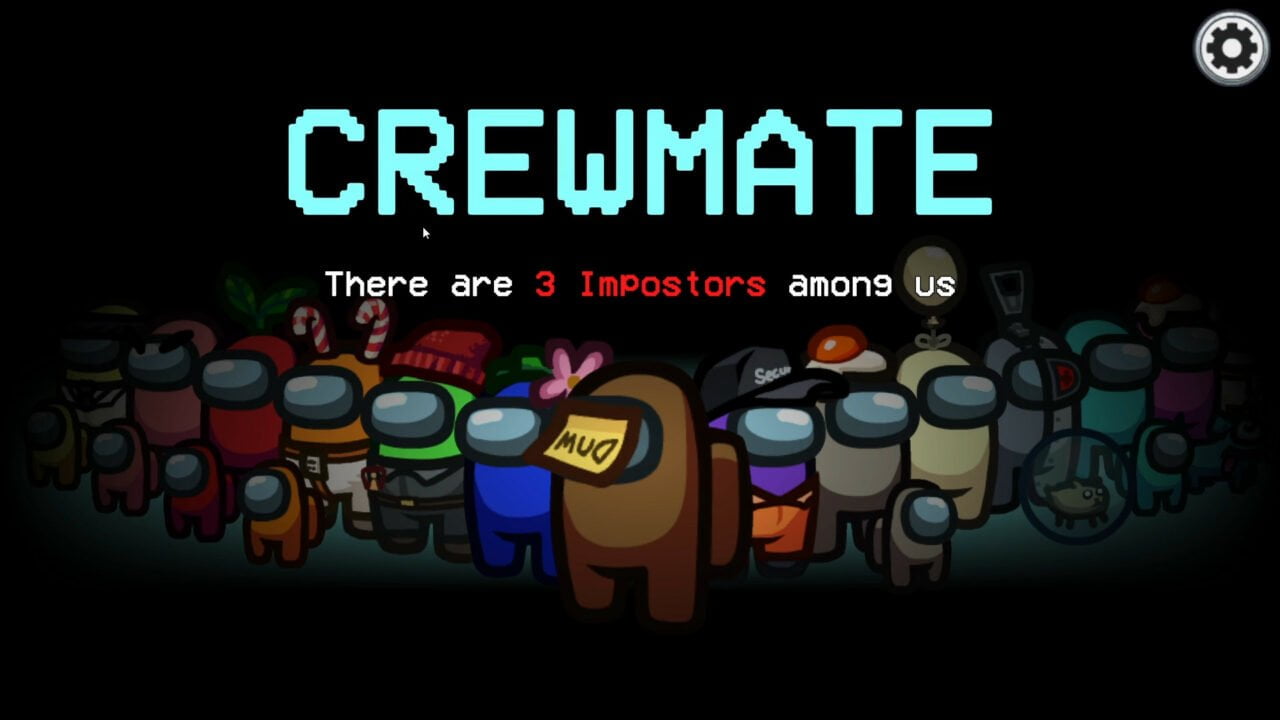
Credits: Among Us © Innersloth
Whenever one dead crew member is discovered, the survivors can hold an emergency meeting to discuss suspicious behavior and try to identify the culprit. At the end of a – very quick – meeting, votes are cast and if there is a clear majority, one crew member is eliminated (ejected from the ship, or “spaced”, the sci-fi equivalent of “walking the plank” in pirate movies and tales. Space justice can be brutal). But what if the players make a mistake and nominate an innocent? In space, no one can hear you scream, “what a pity”. The game goes on until the crew completes a set number of tasks, all the Impostors are found, or the Impostor manages to sabotage the mission.
How to organise the workshop
It’s a fast game, with a single match lasting 5-10 minutes divided into different rounds, and involving 4-15 players. It offers tonnes of customisation (the number of impostors, the skins of crews and ships, and many accessories and cosmetic options), a catchy and cartoonish visual style, and the very valuable possibility of crossplay between PCs and mobile devices.
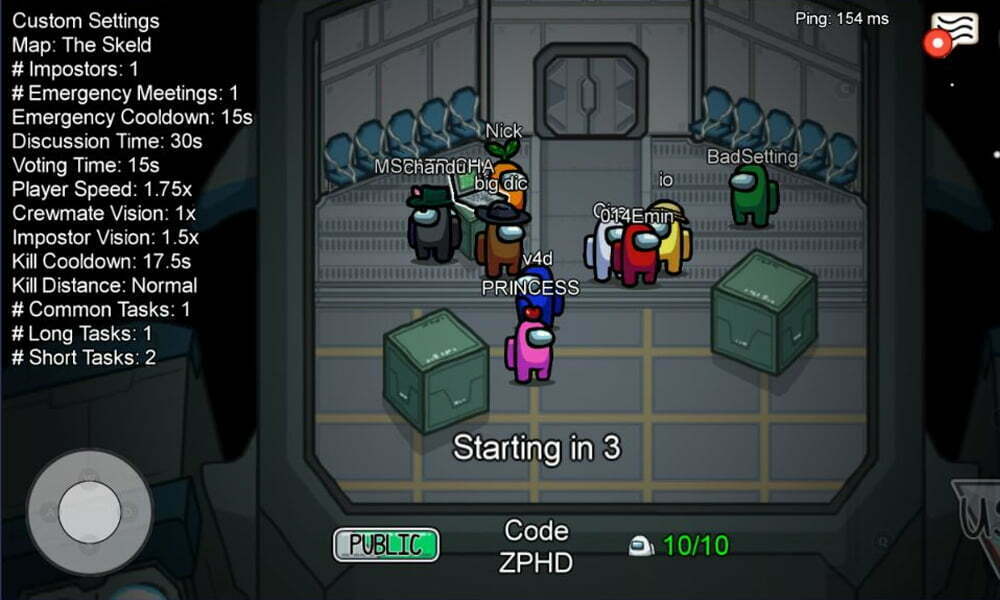
Credits: Among Us © Innersloth
An immediate debriefing session, insisting on exploring with players how their choices were made and why, can lead to very interesting reflection about the group decision-making process, which is one of the key elements of participation.
Lessons learnt from the game
“Among Us” offers interesting opportunities for communication, conflict resolution, social deduction and decision-making, all in a very fast and engaging package. It is participatory by design, because it makes participation fun. In a group of young people, players can lie, bluff, probe each other’s minds looking for alibis, and in the end they have to make hard and fast decisions. The group of players can only succeed if they work as a team and learn to trust one another, in situations of limited information and rationality. The decision-making skills of players are put under stress, and these real-life skills are exercised.
In a youth work setting, a facilitator could also lead a debriefing discussion after the game, to help players recognise and assess the skills which were at play when they had their meetings and made their decision (resulting in death sentences), evaluating mistakes, bluffing, and so on.
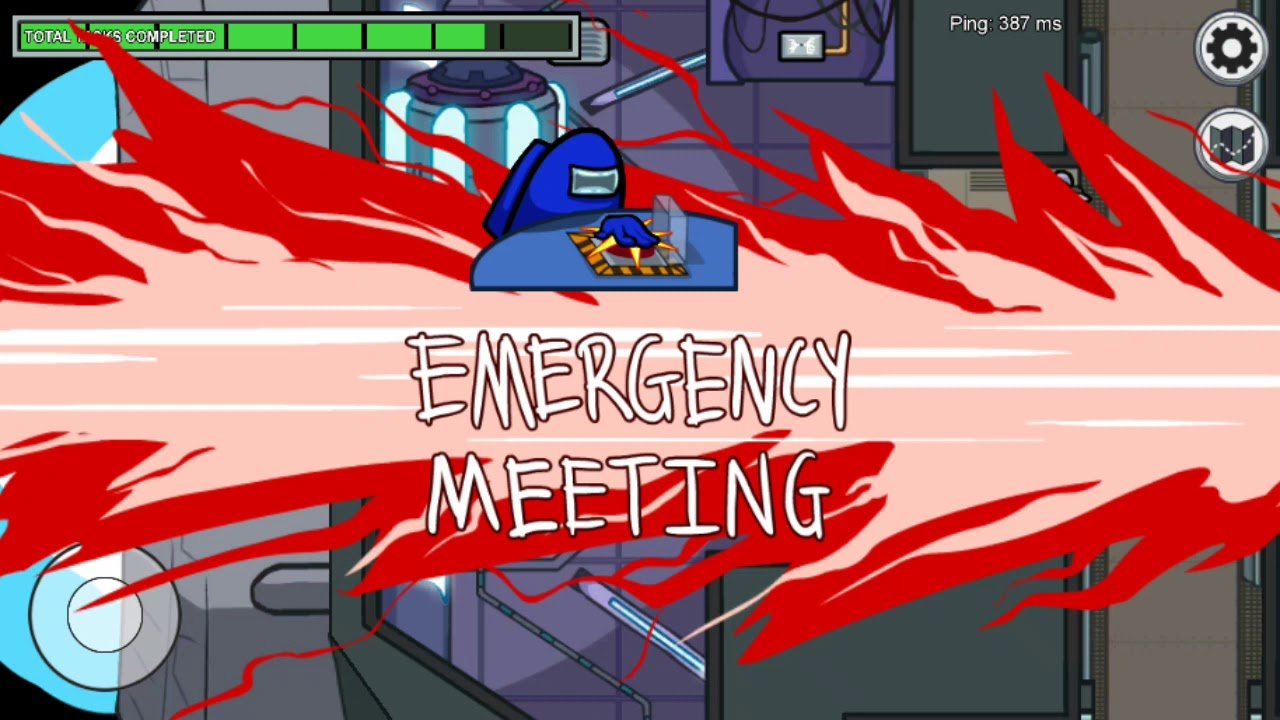
Credits: Among Us © Innersloth
During the evening sessions of the online European Youth Work Convention, in December 2020, sessions of Among Us were facilitated to showcase the possible use of videogames to improve participation skills.
About the game: Civilization 6: Gathering Storm
This game is the last entry of a franchise that literally made history in videogames (the first “Civilization” release, developed by the legendary Sid Meier, was published in 1991).
It is a simulation of the entire development of human civilisation, starting from the Stone Age and reaching out to the future. It is based on actual history, but it also allows the players to make their own decisions and take different paths.
Wisely managing resources, developing science, knowledge, exploration (but also religion, philosophy, politics…), choosing peace or war, keeping a wide set of statistics on the overall condition of your citizens under control (and in the latest installments, also on the environment) you get to decide how humankind will develop, sometimes with very unpredictable outcomes, when you for instance avoid the colonisation of America, or avoid World War II etc.
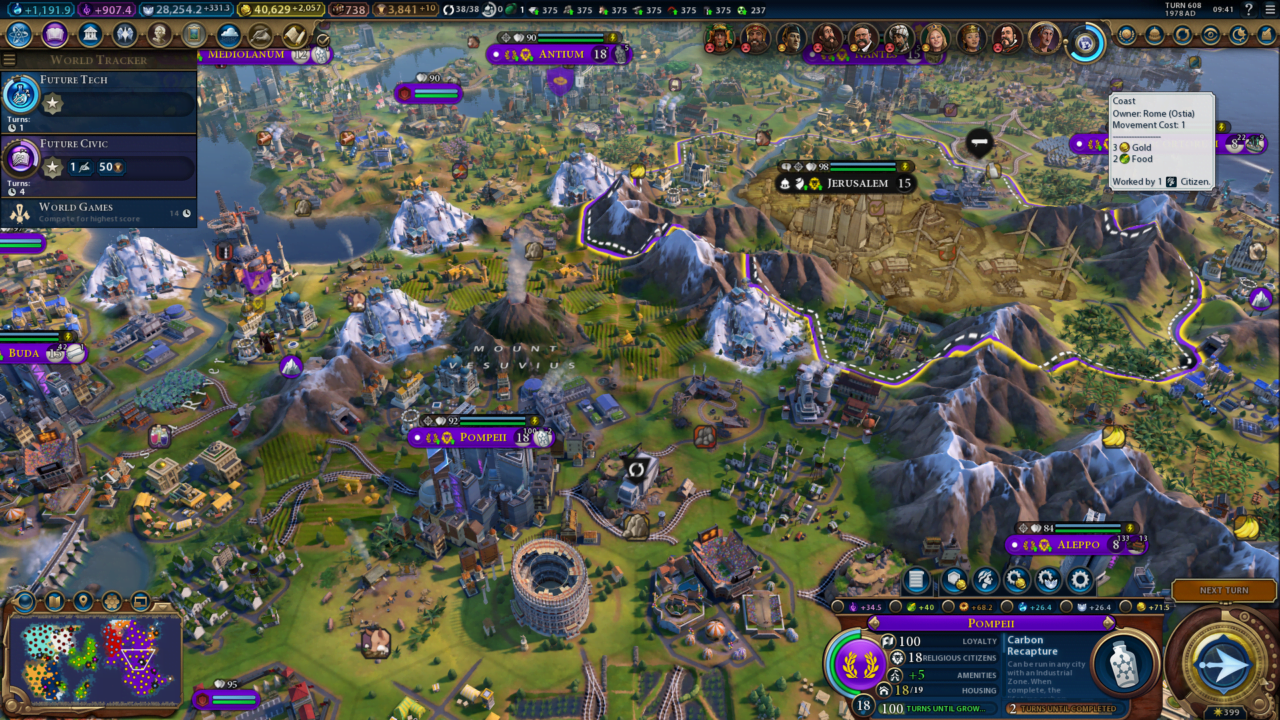
Credits: in-game picture created by Carmine Rodi Falanga; Civilisation © Firaxis
In its over 30 years of existence, it has been the subject of an impressive number of studies – it’s used in a variety of academic courses to learn Diplomacy, International Economy and Law as well as by companies and public administration across the world to hire better managers.
What is it about? It’s the essential strategy game, in which players control human “Civilizations” from their humble beginnings as a band of settlers, to building sprawling cities and later expanding into world-spanning empires. Players make decisions which will have a profound impact on the game-world history. A single match can last less than an hour (at the fastest speed), or more than one day in the most epic, time-demanding settings; and during the course of a campaign, players will take all sorts of decisions regarding their civilisations: city and infrastructure development, scientific and technological progress, domestic economy and international trade, arts and culture, industry, religion, diplomacy and military affairs are all included in the game. The players’ decisions completely define how that specific civilisation life-span will unfold.
“Civ” (as it is affectionately known to its fans), especially with the latest entries in the franchise, manages to keep all this complexity approachable by giving it a distinct “gamey” feeling. Graphics are vibrant, the game world feels alive and is fascinating to explore. The game never really shows the most horrific aspects of the history it simulates, like war, pollution or colonialism (all of which can be and is a criticism of the game – but this is beyond the scope of this article).
In short, it is a huge videogame classic, and for good reasons.
Relevant elements in the game experience
Players without a doubt learn and experience the micro and macro aspects of taking decisions while managing a complex entity, even though clearly a simplified one. The backdrop is historical (a heavily simplified one, and full of “what if” alternate scenarios) and this – together with other successful game franchises – is inspiring thousands of young people to approach the study of history as a subject from a more systematic point of view, and maybe more interestingly, to participate in the (simulated) co-development of a society by taking (real) informed decisions, about the economy, education, environment and so on. Youth work can capitalise on this, creating activities in which game sessions could be debriefed to describe which decisions were taken (and how: Does Might Make Right? or did players follow a more inclusive approach?), and then maybe try again with a different approach to see what happens.
The sixth version of the game is the most modern, is very successful, and raised the bar of contemporary game design. It attracted history and strategy fans, as well as people interested in a more casual experience. However, what really elevated it to a higher level was its latest expansion, “Gathering Storm”, released in 2019.
It introduced a few new aspects into the game, notably extreme weather and natural disasters, but most importantly translated the much-needed reality of Climate Change into the game mechanics. It is important to remember that ecology as a theme has already been present in the original Sid Meier games (as far back as in the 1990s), but this time the message hits home as clearly as possible.
Players will affect the world and its ecosystem with their decisions, and their choices about industrialisation, land use, power production and consumption have a big impact on every game. Cut down too many forests and pump too much CO2 into the air through industry and lifestyle, and the atmosphere will start to change, with severe consequences on the global climate and on everybody’s life.
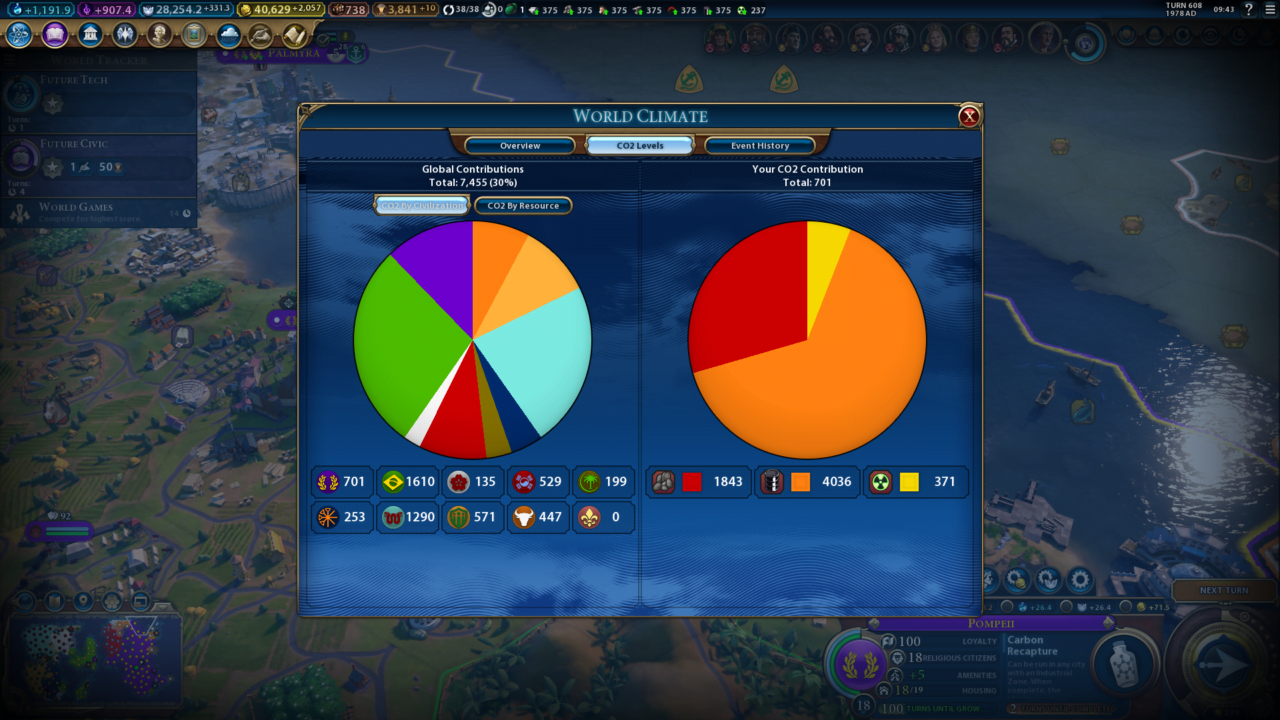
Credits: in-game picture created by Carmine Rodi Falanga; Civilisation © Firaxis
While still simplified (nuclear weapons in particular are not nearly as destructive as they should be), this representation of the climate crisis is stark: mess things up, and there will be consequences. Bad ones. That millennia-old city built on the coastline? Will probably disappear under the rising sea, together with all its wonders, and there is nothing you can do about it.
The farmlands that feed millions? Watch as they are made useless by desertification, hurricanes, or pollution. The message is clear, and since we are living in strange times, this aspect has proven to be divisive; again this is a great way to bring up this kind of discussion in a youth work setting: how do we approach knowledge, and can we let opinions get in the way of facts?
A specific part of the gaming community doesn’t like to be reminded that they live in a world where political decisions matter and decisions have consequences, so educating young people to face the consequences of their choices, as this game does, already seems provocative to some: “keep politics out of games” is a slogan heard often in this context. The developers had to issue a statement to address this: “No, I don’t think that it’s about making a political statement,” said lead producer, Dennis Shirk. “We just like to have our gameplay reflect current science.”
How to organise the workshop
This is definitely another reason why this game can be a perfect educational tool if used in expert hands. There is a chilling and very specific feeling coming from realising that, in order to support a few nations’ thirst for industrialisation, the world is going to suffer badly – and this is backed by facts, verified data and science.
The game comes in many different languages, and this could help your target groups to get involved. Multiplayer games, even locally (with up to 6 players sharing the same device) can directly engage a small group, or you can decide to stress the decision-making process even more, asking couples of trios to play together as one the various civilisations competing in the game.
Playing the game in a youth work setting, maybe breaking it down into shorter sessions over more days, since the length of a “match” can be counted in tens of hours at least, could be a great way to open discussions about the impact of political choices and how informed decisions should be made.
What is even more interesting, a “Climate Panel” can be summoned at any time, and it will show very detailed information about the current in-game situation, the consequences of climate change on life and business, and the CO2 emissions of each in-game country, offering an abundance of data and highlighting cause-effect relations.
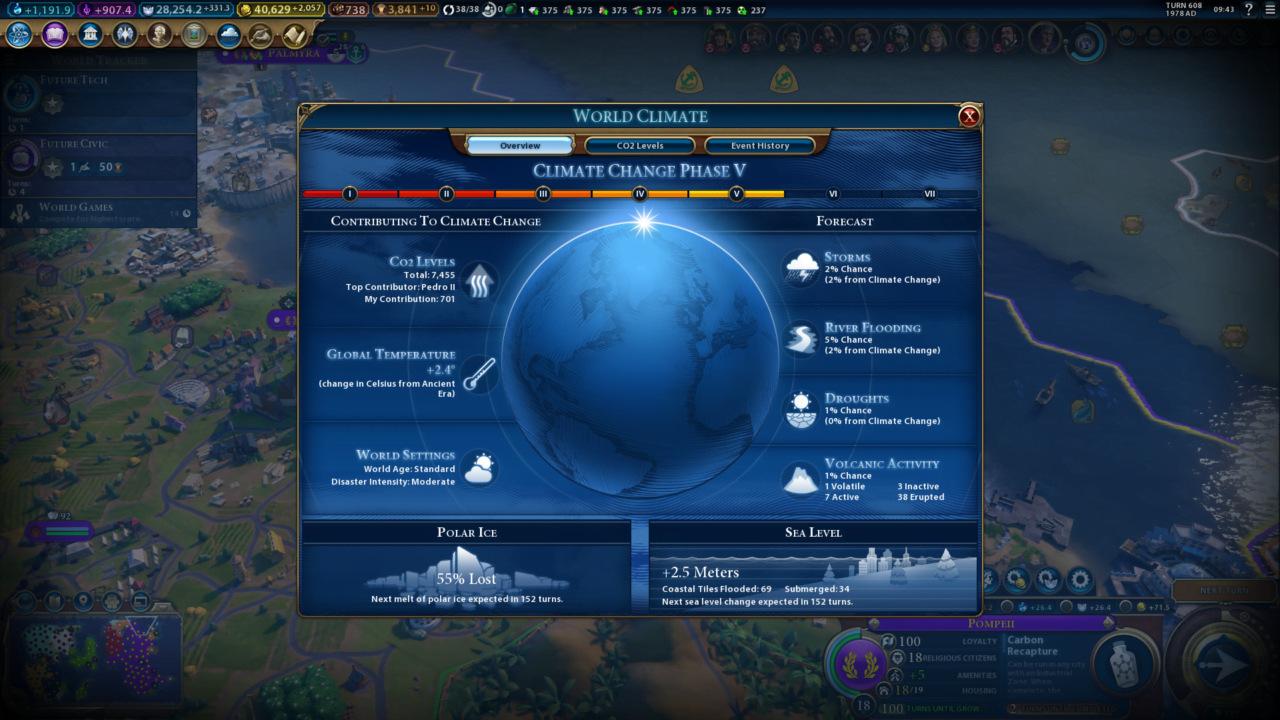
Credits: in-game picture created by Carmine Rodi Falanga; Civilisation © Firaxis
Here is the part of the game where the topic of participation can be better identified: decisions to reduce pollution can only be effective if taken collectively by most players – something that could actually be done in-game, thanks to the “World Congress” feature (something like a more effective version of the United Nations) – but many times, you will discover that players will find short-term strategies and goals much more affordable and tempting. After all, the most important thing is to win the game, right? Even if with some games, “the only winning move is not to play”?
Again, playing these scenarios in a youth work setting and then discussing the consequences of going for short-term, immediate satisfaction instead of more complex long-term solutions, offers a chance to discuss many current political issues, stemming from the outcome of a videogame session.
Lessons learnt
A single match encompasses thousands of years of human activity, and so it allows a bird’s-view experience, where complex cause-effect relations can be identified and explored in depth.
A group can experience an incredibly rich and transformative journey by playing a long-term multiplayer game of Civ 6, divided into a few days and facilitated with frequent debriefing sessions and analysis. Players may get to record their most important decisions, compare choices, and consider what they have achieved over a multi-session game: and not only on their civilisations but also on other players, and the game world itself.
Used in this context, Civilization 6 can really become a tool that allows some of the most engaging, complex and emerging participation experiences. A really profound experience that without a doubt includes a rich and layered learning process, and where the role of youth workers is important in revealing and unfolding all the different layers in this experience.





